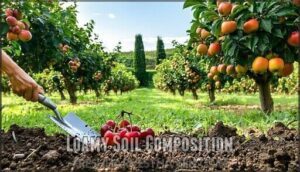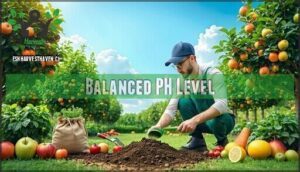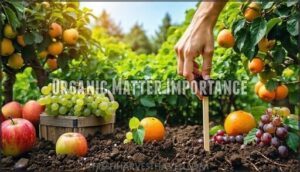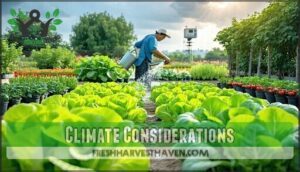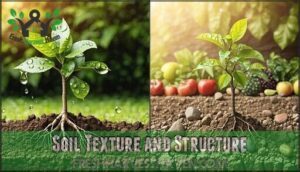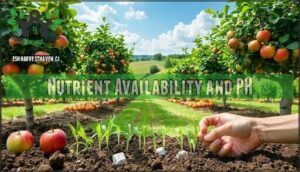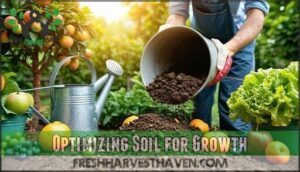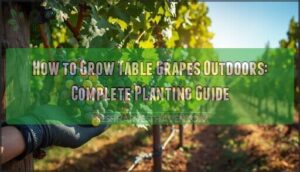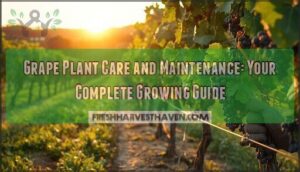This site is supported by our readers. We may earn a commission, at no cost to you, if you purchase through links.
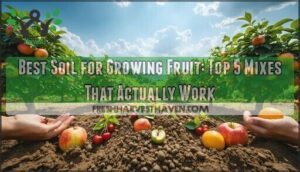 You’ll want the best soil for growing fruit that’s well-draining yet moisture-retentive – think of it as the Goldilocks zone for roots.
You’ll want the best soil for growing fruit that’s well-draining yet moisture-retentive – think of it as the Goldilocks zone for roots.
A loamy mix with 40% sand, 40% silt, and 20% clay creates the perfect foundation.
Your pH should hover between 6.0-7.0, slightly acidic but not too cranky.
Add organic compost for nutrients and perlite for drainage – your fruit trees will thank you with bigger harvests.
Sandy loam beats heavy clay every time since waterlogged roots spell disaster.
The secret isn’t just what you mix, but how you layer these components for maximum root development to achieve the perfect balance, ensuring your fruit trees receive the right amount of water and nutrients, and the perfect foundation is laid.
Table Of Contents
- Key Takeaways
- Soil Requirements for Fruit
- Best Soil Mixes for Fruit
- Factors Influencing Soil Choice
- Optimizing Soil for Growth
- Frequently Asked Questions (FAQs)
- What is the best soil for growing fruit?
- What is the best mix for fruit trees?
- What kind of soil is best for apple trees?
- What is the best soil for fruit plants?
- Which soil is good for fruits and vegetables?
- What is the best soil mix for fruit trees in pots?
- What is best to put under fruit trees?
- How does soil impact fruit tree longevity?
- What are signs of poor soil health?
- Can mulch types affect soil composition?
- Conclusion
Key Takeaways
- You’ll get the best results with sandy loam soil that’s 40% sand, 40% silt, and 20% clay – this creates perfect drainage while retaining moisture and nutrients your fruit trees need.
- Keep your soil pH between 6.0-7.0 by testing annually and adjusting with lime or sulfur, since wrong pH levels block nutrient absorption and stunt growth.
- Mix in organic compost and perlite to boost soil fertility and drainage – waterlogged roots kill more fruit trees than drought, so proper aeration is critical.
- Layer 2-3 inches of organic mulch around your trees to suppress weeds, retain moisture, and gradually improve soil structure as it decomposes.
Soil Requirements for Fruit
Growing fruit successfully starts with understanding what your plants need from the soil beneath them.
The right soil composition creates the foundation for healthy root development, nutrient uptake, and ultimately, a bountiful harvest.
Loamy Soil Composition
Understanding loam soil composition is your foundation for growing thriving fruit trees.
Loam provides the perfect balance that fruit trees crave for maximum growth.
Here’s what makes loam soil composition ideal:
- 40% sand – guarantees proper drainage and prevents waterlogging
- 40% silt – retains moisture and provides nutrient availability
- 20% clay content – binds nutrients and maintains soil structure
- 4-5% organic matter – enhances nutrient rich soil and water retention
- 50% pore space – allows air and water movement through soil structure improvement
This balanced soil composition creates the granular, porous structure that fruit tree roots need to flourish.
To achieve this balance, consider the importance of soil testing methods for maximum tree growth.
Balanced PH Level
Most fruit trees perform best when soil pH stays between 6.0-7.0.
You’ll want to test your soil annually since pH affects nutrient uptake dramatically.
Acidic conditions below 5.5 limit calcium and phosphorus availability, while alkaline levels above 7.5 block iron absorption.
Use lime to raise pH or sulfur to lower it for ideal nutrient balance.
Understanding the importance of soil preparation techniques is vital for maintaining a healthy fruit garden.
Organic Matter Importance
Organic matter acts like your soil’s personal chef, constantly cooking up nutrients for hungry fruit trees.
Compost benefits include slow-release feeding that keeps roots happy year-round. This soil enrichment process transforms kitchen scraps into nutrient-rich gold through composting.
Organic fertilizers from decomposed materials boost soil fertility naturally. Humus formation creates the perfect soil health foundation, while nutrient cycling guarantees nothing goes to waste in your garden’s ecosystem.
The use of an organic soil mix can substantially enhance the overall quality of your soil.
Drainage and Aeration
Poor drainage kills more fruit trees than drought ever will.
When soil lacks proper soil porosity, water infiltration becomes sluggish, creating waterlogged conditions that suffocate roots.
Your fruit trees need soil aeration for root respiration – compacted soil blocks air circulation and stunts growth.
Well-structured soil balances water retention with drainage, preventing soil compaction while maintaining ideal soil structure for healthy root development.
Best Soil Mixes for Fruit
You’ll need the right soil mix to turn your fruit-growing dreams into reality.
These five proven options deliver the drainage, nutrients, and pH balance that fruit trees crave for maximum production.
1. Dr Earth Fruit Tree Planting Mix
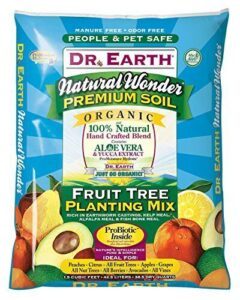
Dr. Earth’s premium fruit tree mix delivers everything your trees crave in one bag.
This organic fertilizer blend combines soil amendments with natural nutrients, creating perfect planting conditions. You’ll get improved soil quality that matters for long-term tree growth boosters.
The mix contains beneficial mycorrhizae and probiotics that enhance root development. It’s your best soil for growing fruit without guesswork or complicated planting techniques, making it a great choice for a long-term tree growth boost.
2. Miracle-Gro Potting Mix 2 cu ft
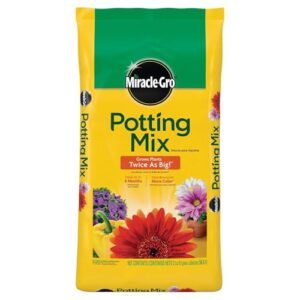
Miracle-Gro Potting Mix delivers consistent soil quality with balanced fertilizer content that supports steady fruit tree growth.
This commercial potting mix maintains ideal moisture retention while preventing waterlogged conditions that damage roots.
You’ll find the mix ratio works well for container gardening, though it lacks the specialized nutrients some fruit trees need for peak performance.
3. Espoma Organic Peat Moss for Gardening
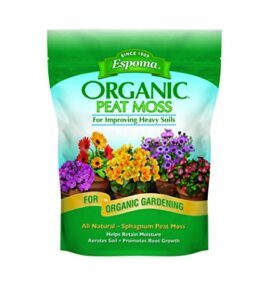
When you’re building soil that drains like a dream, Espoma’s organic peat moss becomes your secret weapon.
This soil amendment transforms heavy clay into workable earth while boosting water retention in sandy conditions.
- Creates fluffy, aerated soil structure that roots love exploring
- Holds moisture without creating waterlogged conditions that kill fruit trees
- Naturally acidic properties benefit acid-loving fruits like blueberries
Mix one part peat moss with existing soil for ideal results. Your fruit trees will thank you with stronger root systems and better harvests.
4. Espoma Organic Perlite Soil Amendment
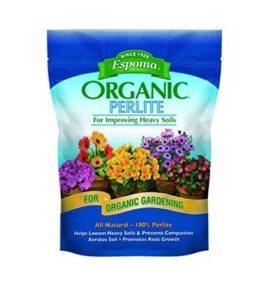
Perlite benefits include exceptional soil aeration and drainage improvement.
This volcanic glass creates air pockets that prevent compaction while maintaining soil structure.
You’ll mix perlite with organic matter at 20-30% ratios for ideal results.
Perlite usage enhances root development by providing oxygen circulation.
These soil amendments support fruit tree soil needs through better water movement and nutrient uptake.
Understanding the ideal soil composition matters is vital for achieving the best results with perlite amendments, which include improved root development and oxygen circulation, leading to enhanced nutrient uptake.
5. Espoma Organic Land and Sea Compost
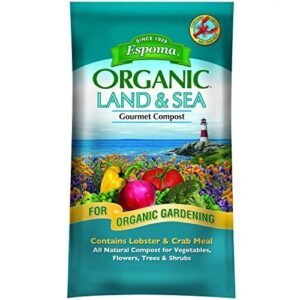
Espoma’s Land and Sea Compost transforms your fruit trees into powerhouses.
This organic matter blend delivers essential nutrients while improving soil structure naturally.
Natural nutrients and better soil structure – the perfect foundation for fruit trees that actually produce.
You’ll find seaweed and composted materials working together, creating the perfect foundation for healthy root development.
The slow-release formula means less frequent applications.
This garden supplement ranks among the top fertilizer options for organic gardening enthusiasts who prioritize soil quality and use organic matter.
Factors Influencing Soil Choice
Selecting the right soil depends on several key factors that directly impact your fruit trees’ success.
Your local climate, soil texture, and nutrient levels work together to determine which growing medium will give you the biggest harvest.
Climate Considerations
Your soil choice hinges on your local climate conditions.
Temperature Control affects root health, while Regional Climates determine which soil drainage levels work best year-round.
Understanding the plant growth factors is vital for effective soil selection.
- Temperature fluctuations – Soil temperature stability matters more in areas with extreme seasonal changes
- Rainfall patterns – Heavy precipitation regions need superior soil drainage to prevent waterlogging
- Humidity levels – High moisture climates require enhanced soil pH levels and aeration for disease prevention
Soil Texture and Structure
Your fruit trees need the right foundation to thrive.
Give your trees the soil foundation they crave for maximum fruit production.
Particle Size affects how water moves through soil – fine clay particles create dense, waterlogged conditions while coarse sand drains too quickly.
Sandy loam offers the sweet spot with balanced Water Holding capacity and Soil Porosity.
Clay Content should stay below 30% to prevent compaction.
Loam soil combines different soil types perfectly, giving roots room to breathe while retaining moisture, providing an ideal environment for growth with the right Water Holding capacity.
Nutrient Availability and PH
Beyond texture lies the chemical foundation of healthy fruit production.
pH levels control nutrient availability, making soil testing your roadmap to success. Most fruit trees thrive when soil pH stays between 6.0-7.0, optimizing nutrient cycling and root health.
- pH Levels: Test annually and adjust with lime or sulfur
- Micronutrients: Iron and zinc become unavailable in alkaline soils
- Fertilizer Types: Match NPK ratios to your soil’s specific deficiencies
Optimizing Soil for Growth
Once you’ve selected the right soil mix, you’ll need to optimize it for maximum fruit production.
The key steps involve improving drainage, maintaining proper pH levels, and boosting soil fertility through strategic amendments.
Improving Drainage and Aeration
Proper drainage transforms waterlogged soil into thriving ground for fruit trees.
You’ll need to address soil porosity and water table issues through targeted aeration methods and drainage systems.
Effective French drain systems require careful planning to guarantee proper water redirection, often involving drainage pipe installation.
| Problem | Solution |
|---|---|
| Compacted soil structure | Add perlite or coarse sand to improve soil texture |
| Poor water drainage | Install French drains or raised beds |
| Limited root depth access | Create drainage channels 18-24 inches deep |
Maintaining Optimal PH Levels
Most fruit trees hit their sweet spot between pH 6.0 and 7.0, though blueberries demand acidic conditions around 4.5-5.5.
pH testing every two years keeps your soil’s nutrient balance in check. When alkalinity levels climb above 7.0, essential minerals get locked up, stunting growth.
Acidic soils below 5.5 limit root development. Ideal ranges guarantee nutrient-rich conditions for maximum soil fertility management.
Achieving soil health benefits is vital for maintaining a balanced ecosystem that supports healthy plant growth, ensuring maximum soil fertility.
Enhancing Soil Fertility and Structure
Building robust soil fertility starts with understanding your foundation. You’ll transform ordinary dirt into nutrient-rich growing medium through targeted soil preparation and strategic amendments.
Proper tree care involves using the right Fruit Tree Fertilizer to enhance soil quality.
- Soil Amendments: Mix compost, aged manure, and organic fertilizer types to boost nutrient availability and improve soil structure
- Compost Tea: Apply weekly during growing season for enhanced microbe management and sustained fertility
- Mulch Benefits: Layer 2-3 inches around trees to retain moisture, suppress weeds, and gradually add organic matter
- Microbe Management: Encourage beneficial bacteria through consistent organic matter additions and proper soil moisture levels
Frequently Asked Questions (FAQs)
What is the best soil for growing fruit?
Sandy loam soil strikes the sweet spot for fruit trees.
You’ll want well-draining dirt that won’t waterlog your roots but still holds moisture and nutrients.
This goldilocks soil keeps your trees happy and productive.
What is the best mix for fruit trees?
You’ll want equal parts existing soil and compost – that’s your golden ratio. This combo gives fruit trees the drainage they crave while keeping nutrients handy for healthy growth.
What kind of soil is best for apple trees?
Apple trees thrive in well-drained loamy soil with a pH between 8 and
You’ll want soil that holds moisture but doesn’t get waterlogged, since soggy roots spell trouble for your apple harvest.
What is the best soil for fruit plants?
Like a gardener’s golden ticket, well-draining sandy loam soil with slightly acidic pH (0-0) and rich organic matter creates the perfect foundation for thriving fruit plants across most species.
Which soil is good for fruits and vegetables?
Well-draining loamy soil works wonderfully for both fruits and vegetables.
You’ll get the perfect balance of water retention and drainage, plus it’s packed with nutrients your plants crave for healthy growth.
What is the best soil mix for fruit trees in pots?
Mix equal parts potting soil and compost with coarse sand or perlite for drainage.
Add a handful of aged manure.
This combo retains moisture while preventing soggy roots that’ll kill your trees.
What is best to put under fruit trees?
Organic mulch like wood chips works wonders — it suppresses weeds, retains moisture, and slowly feeds your trees as it decomposes, creating the perfect foundation for healthy growth.
How does soil impact fruit tree longevity?
Soil directly affects your tree’s lifespan by controlling root health, nutrient absorption, and disease resistance.
Well-drained, nutrient-rich soil prevents root rot and stress, helping trees live decades longer than those struggling in poor conditions.
What are signs of poor soil health?
You’ll spot yellowing leaves, stunted growth, poor drainage creating puddles, compacted earth that’s hard to dig, and weak fruit production signaling your soil needs attention.
Can mulch types affect soil composition?
Yes, different mulch types gradually change your soil’s chemistry and structure.
Organic mulches like wood chips acidify soil while decomposing, adding carbon-rich matter.
Inorganic options like gravel won’t alter composition but affect drainage patterns.
Conclusion
Success breeds success when you choose the best soil for growing fruit wisely.
You’ve learned that proper drainage, balanced pH, and organic matter create thriving conditions for your trees.
Whether you select commercial mixes or blend your own, remember that healthy soil equals healthy fruit.
Test your pH regularly, add compost annually, and monitor drainage patterns.
Your investment in quality soil will reward you with abundant harvests for years to come.
- https://www.breakawaylandscaping.ca/blog/soil-needs-for-fruit-trees-your-guide-to-growing-fruits-at-home
- https://www.homedepot.com/c/ai/how-to-plant-fruit-trees/9ba683603be9fa5395fab90b5a45391
- https://www.sedgwick.k-state.edu/gardening-lawn-care/documents/Planning-Your-Fruit-Garden_MF352.pdf
- https://growingfruit.org/t/soil-depth-and-fruit-and-nut-trees/50054
- https://extension.umd.edu/resource/starting-home-fruit-garden

